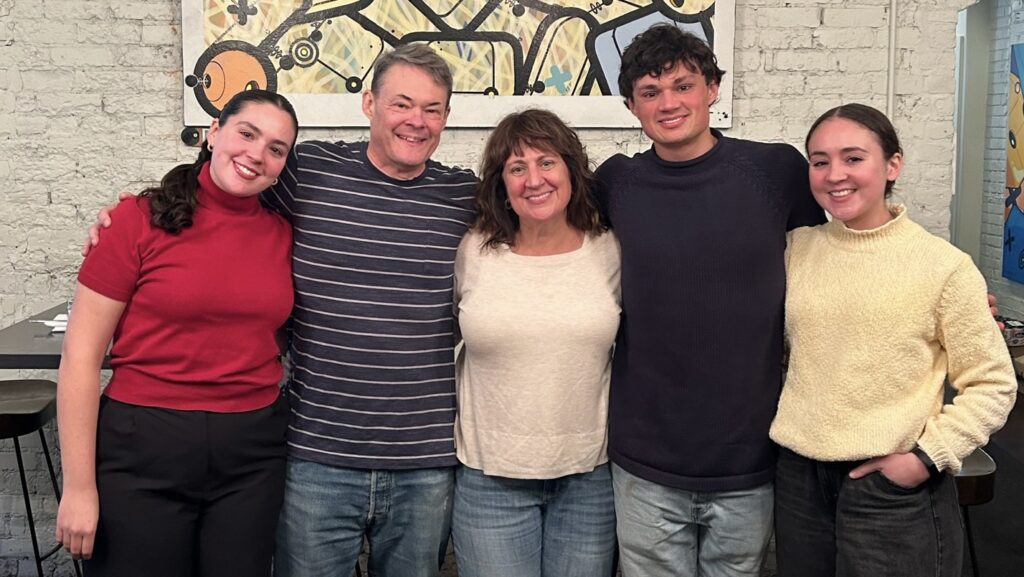Bowman2
EDITOR’S NOTE: The Newton Beacon is reaching out to all candidates for City Council for interviews and profile stories. The Newton Beacon is independent and nonpartisan, and coverage does not mean endorsement.
One morning 20 years ago, Alicia Bowman was walking her daughter, Camille, to her first day of kindergarten at Mason-Rice Elementary School when cars whizzed by carrying other children to school. “Why aren’t they walking?” she asked herself.
She didn’t know it at the time, but that one incident was the kick-starter to two decades of community activism and two terms on the City Council.
Bowman, is seeking a third term for one of two Ward 6 councilor-at-large seats and, for the longtime Newton Center resident and mother of three, her political career has been defined in large part by a drive to help kids get around safely.
It started with her belief that children should be walking to their neighborhood school rather than be chauffeured by parents. It has continued with her efforts to promote more affordable housing when she saw the limited options available to her parents when it was no longer feasible to live in their Victorian Newton Centre home.
But for the former banking and management consultant, it was her passion for getting children walking and biking to school that began it all.
Getting kids moving
“When I saw the children being driven to school I was like, ‘Wait, what do you mean kids don’t walk to school? What are you doing?’” Bowman recalled. “I was complaining about it for about a year and met others who also thought it was horrible.”
So Bowman co-founded the Safe Routes to Schools Taskforce in Newton with Theresa Fitzpatrick. The initiative is designed to increase safe walking and biking for elementary, middle and high school students. At the time, SRST was a newly formed federal program.
As a city councilor, she has called for redesigning the entrance to some schools so there is no easy car drop-off point in front of the school.
“If you still want to drive them, at least park a few blocks away and walk them the rest of the way,” she said.

Bowman, who is a past president of Bike Newton and founder of Tour de Newton, the city’s premier cycling event, has continued working to encourage more Newtonians to get out of their cars and walk and bike.
“I think it is really critical that we give people safe, easy choices for transportation,” she said.
A major component of that effort, Bowman said, is building protected bike lanes. The first protected bike lane will run the full length of Needham Street and there will be a trial bike lane on Washington Street.
She has also been appointed as the Council’s representative to the Bicycle and Pedestrian Master Plan Project, an initiative she has been advocating for the past ten years.
Housing and an ‘Ah-ha’ moment
Bowman is concerned about the need for a greater variety of housing, including smaller units and more units that are accessible to those with disabilities. She’s working on those issues as a member of the council’s Land Use Committee as well as Newton’s Affordable Housing Trust.
Bowman said that her in-laws, who had lived in a Victorian-style home in Newton Centre for more than 50 years, wanted to move to a smaller place where they could remain independent. The options were very limited at the time, she said. “It was very sad.”
Around that time, Bowman was at a meeting with some city councilors and one resident said, “If people can’t afford to live here, there are other places they could go. They could move to Ohio.”
Bowman said that discussion, with some seniors sitting in the room, infuriated her. She called it “a real ‘ah-hah’ moment.” At the urging of a friend over a cup of coffee, she decided to run for City Council and work on zoning and housing.
She’s an advocate of the Village Center Overlay District project. and said it “will enable a greater variety of housing to be built, better support the housing needs of residents, and sustainable, vibrant village centers.”
While she expects the VCOD to be approved by the City Council later this year, she expressed some concern about a possible referendum to repeal it.
“A referendum is always a possibility with major decisions we make,” Bowman said. “In 2020 Newton had the referendum on the Northland project. Village center zoning, while only covering three percent of Newton, will be adjacent to many more residents than Northland.”
A referendum could be particularly challenging, she pointed out. “I hope that it doesn’t come to that, as zoning is a very complicated issue to be on the ballot.”
Addressing the city’s housing crisis, particularly near some of Newton’s village centers, is important to the area’s economic health and diversity, Bowman said.
“We really need the new housing development to make the villages prosper,” she said, adding that if more people lived near the village centers it would encourage more businesses to open and provide a diversity of services.
She pointed to Newton Corner as an example of a village where “there’s nothing to do” but on that could change if there was increased housing. A higher density of residents would attract more businesses in the area, she predicted.
Newton’s election will be Nov. 7, with early voting starting on Oct. 28.